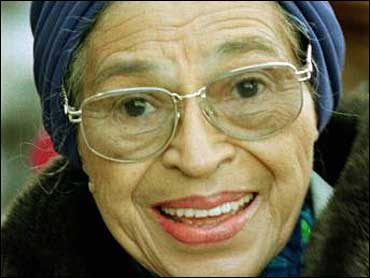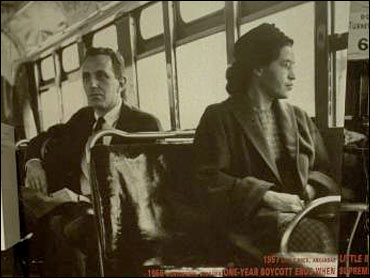|
Rosa Parks (February
4, 1913 – October 24, 2005)
Awards: Numerous honorary degrees; major thoroughfare in Detroit is named after
her; SCLC sponsors an annual Rosa Parks Freedom Award; Spingarn Medal, NAACP, 1979; Martin Luther King Jr Award, 1980; Service
Award, Ebony, 1980; Martin Luther King Jr Nonviolent Peace Prize, 1980; The Eleanor Roosevelt Women of Courage Award, Wonder
Women Foundation, 1984; Medal of Honor, awarded during the 100th birthday celebration of the Statue of Liberty, 1986; Martin
Luther King Jr Leadership Award, 1987; Adam Clayton Powell Jr Legislative Achievement Award, 1990; Rosa Parks Peace Prize;
honored with Day of Recognition by Wayne County Commission; U.S. Congressional Gold Medal of Honor, 1999.
Most historians date the beginning of the modern civil rights movement in the United States
to December 1, 1955. That was the day when an unknown seamstress in Montgomery, Alabama refused to give up her bus seat to
a white passenger. This brave woman, Rosa Parks, was arrested and fined for violating a city ordinance, but her lonely act
of defiance began a movement that ended legal segregation in America, and made her an inspiration to freedom-loving people
everywhere.
Rosa Parks was born Rosa Louise McCauley in Tuskegee, Alabama to James McCauley, a carpenter,
and Leona McCauley, a teacher . At the age of two she moved to her grandparents' farm in Pine Level, Alabama with her mother
and younger brother, Sylvester. At the age of 11 she enrolled in the Montgomery Industrial School for Girls, a private school
founded by liberal-minded women from the northern United States. The school's philosophy of self-worth was consistent with
Leona McCauley's advice to "take advantage of the opportunities, no matter how few they were."
Opportunities were few indeed. "Back then," Mrs. Parks recalled in an interview, "we didn't
have any civil rights. It was just a matter of survival, of existing from one day to the next. I remember going to sleep as
a girl hearing the Klan ride at night and hearing a lynching and being afraid the house would burn down." In the same interview,
she cited her lifelong acquaintance with fear as the reason for her relative fearlessness in deciding to appeal her conviction
during the bus boycott. "I didn't have any special fear," she said. "It was more of a relief to know that I wasn't alone."
After attending Alabama State
Teachers College, the young Rosa settled in Montgomery, with her husband, Raymond Parks. The couple joined the local chapter
of the NAACP and worked quietly for many years to improve the lot of African-Americans in the segregated south.
"I worked on numerous cases with the NAACP," Mrs. Parks recalled, "but we did not get the
publicity. There were cases of flogging, peonage, murder, and rape. We didn't seem to have too many successes. It was more
a matter of trying to challenge the powers that be, and to let it be known that we did not wish to continue being second-class
citizens."
The bus
incident led to the formation of the Montgomery Improvement Association, led by the young pastor of the Dexter Avenue Baptist
Church, Dr. Martin Luther King, Jr. The association called for a boycott of the city-owned bus company. The boycott lasted
382 days and brought Mrs. Parks, Dr. King, and their cause to the attention of the world. A Supreme Court Decision struck
down the Montgomery ordinance under which Mrs. Parks had been fined, and outlawed racial segregation on public transportation.
Rosa Parks Her
simple act of protest galvanized America's civil rights revolution By RITA DOVE
We know the story. One December evening, a woman left work and boarded a bus for home.
She was tired; her feet ached. But this was Montgomery, Ala., in 1955, and as the bus became crowded, the woman, a black woman,
was ordered to give up her seat to a white passenger. When she remained seated, that simple decision eventually led to the
disintegration of institutionalized segregation in the South, ushering in a new era of the civil rights movement.
This,
anyway, was the story I had heard from the time I was curious enough to eavesdrop on adult conversations. I was three years
old when a white bus driver warned Rosa Parks, "Well, I'm going to have you arrested," and she replied, "You may go on and
do so." As a child, I didn't understand how doing nothing had caused so much activity, but I recognized the template: David
slaying the giant Goliath, or the boy who saved his village by sticking his finger in the dike. And perhaps it is precisely
the lure of fairy-tale retribution that colors the lens we look back through. Parks was 42 years old when she refused to give
up her seat. She has insisted that her feet were not aching; she was, by her own testimony, no more tired than usual. And
she did not plan her fateful act: "I did not get on the bus to get arrested," she has said. "I got on the bus to go home."
Montgomery's
segregation laws were complex: blacks were required to pay their fare to the driver, then get off and reboard through the
back door. Sometimes the bus would drive off before the paid-up customers made it to the back entrance. If the white section
was full and another white customer entered, blacks were required to give up their seats and move farther to the back; a black
person was not even allowed to sit across the aisle from whites. These humiliations were compounded by the fact that two-thirds
of the bus riders in Montgomery were black.
Parks
was not the first to be detained for this offense. Eight months earlier, Claudette Colvin, 15, refused to give up her seat
and was arrested. Black activists met with this girl to determine if she would make a good test case — as secretary
of the local N.A.A.C.P., Parks attended the meeting — but it was decided that a more "upstanding" candidate was necessary
to withstand the scrutiny of the courts and the press. And then in October, a young woman named Mary Louise Smith was arrested;
N.A.A.C.P. leaders rejected her too as their vehicle, looking for someone more able to withstand media scrutiny. Smith paid
the fine and was released.
Six
weeks later, the time was ripe. The facts, rubbed shiny for retelling, are these: On Dec. 1, 1955, Mrs. Rosa Parks, seamstress
for the Montgomery Fair department store, boarded the Cleveland Avenue bus. She took a seat in the fifth row — the first
row of the "Colored Section." The driver was the same one who had put her off a bus 12 years earlier for refusing to get off
and reboard through the back door. ("He was still mean-looking," she has said.) Did that make her stubborn? Or had her work
in the N.A.A.C.P. sharpened her sensibilities so that she knew what to do — or more precisely, what not to do: Don't
frown, don't struggle, don't shout, don't pay the fine?
At
the news of the arrest, local civil rights leader E.D. Nixon exclaimed, "My God, look what segregation has put in my hands!"
Parks was not only above moral reproach (securely married, reasonably employed) but possessed a quiet fortitude as well as
political savvy — in short, she was the ideal plaintiff for a test case.
She
was arrested on a Thursday; bail was posted by Clifford Durr, the white lawyer whose wife had employed Parks as a seamstress.
That evening, after talking it over with her mother and husband, Rosa Parks agreed to challenge the constitutionality of Montgomery's
segregation laws. During a midnight meeting of the Women's Political Council, 35,000 handbills were mimeographed for distribution
to all black schools the next morning. The message was simple:
"We
are...asking every Negro to stay off the buses Monday in protest of the arrest and trial... You can afford to stay out of
school for one day. If you work, take a cab, or walk. But please, children and grown-ups, don't ride the bus at all on Monday.
Please stay off the buses Monday."
Monday
came. Rain threatened, yet the black population of Montgomery stayed off the buses, either walking or catching one of the
black cabs stopping at every municipal bus stop for 10 cents per customer — standard bus fare. Meanwhile, Parks was
scheduled to appear in court. As she made her way through the throngs at the courthouse, a demure figure in a long-sleeved
black dress with white collar and cuffs, a trim black velvet hat, gray coat and white gloves, a girl in the crowd caught sight
of her and cried out, "Oh, she's so sweet. They've messed with the wrong one now!"
Yes,
indeed. The trial lasted 30 min., with the expected conviction and penalty. That afternoon, the Montgomery Improvement Association
was formed. So as not to ruffle any local activists' feathers, the members elected as their president a relative newcomer
to Montgomery, the young minister of Dexter Avenue Baptist Church: the Rev. Martin Luther King Jr. That evening, addressing
a crowd gathered at the Holt Street Baptist Church, King declared in that sonorous, ringing voice millions the world over
would soon thrill to: "There comes a time that people get tired." When he was finished, Parks stood up so the audience could
see her. She did not speak; there was no need to. Here I am, her silence said, among you.
And
she has been with us ever sinceva persistent symbol of human dignity in the face of brutal authority. The famous U.P.I. photo
(actually taken more than a year later, on Dec. 21, 1956, the day Montgomery's public transportation system was legally integrated)
is a study of calm strength. She is looking out the bus window, her hands resting in the folds of her checked dress, while
a white man sits, unperturbed, in the row behind her. That clear profile, the neat cloche and eyeglasses and sensible coat
— she could have been my mother, anybody's favorite aunt.
History
is often portrayed as a string of arias in a grand opera, all baritone intrigues and tenor heroics. Some of the most tumultuous
events, however, have been provoked by serendipity — the assassination of an inconsequential archduke spawned World
War I, a kicked-over lantern may have sparked the Great Chicago Fire. One cannot help wondering what role Martin Luther King
Jr. would have played in the civil rights movement if the opportunity had not presented itself that first evening of the boycott
— if Rosa Parks had chosen a row farther back from the outset, or if she had missed the bus altogether.
At
the end of this millennium (and a particularly noisy century), it is the modesty of Rosa Parks' example that sustains us.
It is no less than the belief in the power of the individual, that cornerstone of the American Dream, that she inspires, along
with the hope that all of us — even the least of us — could be that brave, that serenely human, when crunch time
comes.
Rita
Dove, former U.S. poet laureate, won the 1987 Pulitzer Prize for Poetry
http://www.time.com/time/time100/heroes/profile/parks01.html
Links
http://teacher.scholastic.com/rosa/
http://edition.cnn.com/2005/US/10/24/parks.obit/
http://www.gale.com/free_resources/bhm/bio/parks_r.htm
http://www.washingtonpost.com/wp-dyn/content/video/2005/10/25/VI2005102500482.html

|
| Rosa Parks in 1998 |
Rosa Parks' landlord has offered to let her stay in her apartment
rent-free, two years after threatening to evict her when the owners said her caretakers missed rental payments.
Parks' doctors say the 91-year-old civil rights pioneer has dementia
and is in poor health. Hartford Memorial Baptist Church in Detroit had been paying Parks' rent, which had been as high as
$1,800 a month, since August 2003, the Rev. Charles Adams said. "We did not want her set out in the street," Adams said. "We
didn't want to make a big noise out of it. ... It was a simple act of kindness." In an October letter, Riverfront Associates,
which owns the apartment where Parks has lived since 1994, said she could stay for free for the rest of her life.
"I thought it was the right thing to do," managing partner Peter
Cummings told the Detroit Free Press for Monday's editions. "This woman is an icon. She deserves an enormous amount of respect.
In a way, I think it's an honor to be able to accord her that respect."

|
| A young Rosa Parks aboard a Montgomery, Alabama, bus in 1955 |
Parks was 42 when she refused to give up her seat on a city bus in Montgomery, Ala., in 1955. Her arrest triggered
a 381-day boycott of the bus system organized by a then little-known Rev. Martin Luther King Jr.
More recently, Parks' lawyers have filed two suits involving the hip-hop duo OutKast and their record company, BMG,
over a song titled "Rosa Parks." They seek a total of $5 billion.
Elaine Steele, who manages the nonprofit Rosa and Raymond Parks Institute, told the newspaper that Parks gets proper
care and eviction notices were sent in error in 2002.
Source: CBS News Dec.
14, 2004
|
